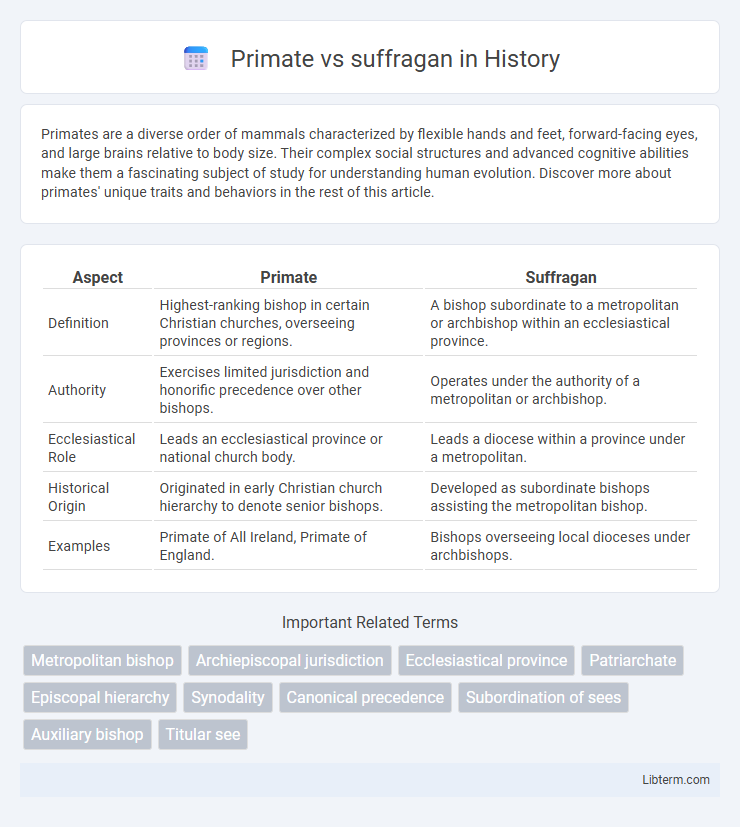Primates are a diverse order of mammals characterized by flexible hands and feet, forward-facing eyes, and large brains relative to body size. Their complex social structures and advanced cognitive abilities make them a fascinating subject of study for understanding human evolution. Discover more about primates' unique traits and behaviors in the rest of this article.
Table of Comparison
| Aspect | Primate | Suffragan |
|---|---|---|
| Definition | Highest-ranking bishop in certain Christian churches, overseeing provinces or regions. | A bishop subordinate to a metropolitan or archbishop within an ecclesiastical province. |
| Authority | Exercises limited jurisdiction and honorific precedence over other bishops. | Operates under the authority of a metropolitan or archbishop. |
| Ecclesiastical Role | Leads an ecclesiastical province or national church body. | Leads a diocese within a province under a metropolitan. |
| Historical Origin | Originated in early Christian church hierarchy to denote senior bishops. | Developed as subordinate bishops assisting the metropolitan bishop. |
| Examples | Primate of All Ireland, Primate of England. | Bishops overseeing local dioceses under archbishops. |
Definition of Primate and Suffragan
A primate is a senior bishop who holds authority over other bishops in an ecclesiastical province or national church, often serving as the chief spiritual leader and representative. A suffragan bishop is a subordinate bishop appointed to assist a diocesan bishop, lacking independent jurisdiction but supporting administrative and pastoral duties. Both roles are integral within hierarchical church structures, with the primate holding overarching leadership and suffragan bishops providing essential support at the diocesan level.
Historical Origins of the Terms
The terms "Primate" and "Suffragan" originated from the hierarchical structures of the early Christian Church, with "Primate" referring to the chief bishop or archbishop of a province, derived from the Latin "primatus," meaning supremacy or first rank. "Suffragan," from the Latin "suffraganeus," originally indicated bishops subordinate to a metropolitan bishop, highlighting their supportive voting role in ecclesiastical councils. These distinctions reflect the development of church governance and territorial authority during the medieval period, shaping the organizational framework of dioceses and archdioceses within Christian institutions.
Hierarchical Roles in the Church
The Primate holds the highest hierarchical authority in a national or regional church, presiding over bishops and representing the church in ecclesiastical and civil matters. Suffragan bishops serve under the authority of a metropolitan or archbishop, assisting in diocesan administration without having autonomous jurisdiction. The distinction highlights the centralized leadership of the Primate versus the supportive and delegated role of suffragan bishops within the church hierarchy.
Primate: Duties and Responsibilities
A Primate in the Anglican or Catholic Church holds the highest rank among bishops within a particular country or region, responsible for leading the national church assembly and representing the church in both religious and civic matters. The Primate's duties include presiding over synods or assemblies, guiding church doctrine, ensuring unity among dioceses, and acting as the chief spokesperson in ecumenical and interfaith dialogues. This role often involves coordinating major church events, overseeing the appointment of bishops, and maintaining the spiritual welfare of the entire church province.
Suffragan: Duties and Responsibilities
Suffragan bishops support the diocesan bishop by overseeing specific regions within the diocese and assisting with pastoral care, ordinations, and confirmations. They perform duties such as leading worship services, managing clergy assignments, and representing the diocese at regional or national church meetings. Their responsibilities often include promoting church growth, ensuring adherence to doctrine, and addressing community concerns under the guidance of the diocesan bishop.
Authority and Jurisdiction Differences
The Primate holds a higher ecclesiastical authority with ceremonial precedence and broader jurisdiction over an entire nation or region, whereas a suffragan bishop operates under the authority of a metropolitan or archbishop within a specific diocese. Primates possess the power to convene provincial synods and represent the church nationally, while suffragan bishops primarily oversee local pastoral and administrative duties without independent jurisdiction. Jurisdictionally, the Primate's role encompasses wider canonical oversight, distinguishing their authority from the suffragan's more limited and subordinate ecclesiastical functions.
Examples of Primates and Suffragans
Primate refers to the senior archbishop or bishop within an ecclesiastical province or country, often holding authority over other bishops; for example, the Archbishop of Canterbury is the Primate of All England. Suffragan bishops are subordinate to a metropolitan or diocesan bishop, assisting in the pastoral and administrative duties within a diocese, such as the Suffragan Bishop of Dover serving under the Archbishop of Canterbury. Another example includes the Primate of All Ireland, with suffragan bishops in various Irish dioceses supporting the primate's leadership.
Primate vs Suffragan: Key Distinctions
Primate and suffragan are distinct ecclesiastical titles within Christian church hierarchy, with the Primate serving as the chief bishop or archbishop of an entire national church, holding significant authority and precedence. Suffragan bishops operate as subordinate bishops assigned to assist a diocesan bishop within a particular region or diocese, lacking autonomous jurisdiction. The primary distinction lies in the Primate's role as the principal leader of a church province, whereas suffragans support diocesan governance without overarching leadership responsibilities.
Modern Relevance of Primate and Suffragan
The modern relevance of primates lies in their role as senior bishops who oversee ecclesiastical provinces, providing spiritual leadership and administrative guidance within national or regional churches. Suffragans serve as subordinate bishops supporting diocesan bishops by managing specific areas or duties, ensuring effective pastoral care and church governance. Their collaborative functions enhance organizational structure and maintain the continuity of hierarchical authority in contemporary Anglican and Catholic dioceses.
Conclusion: Understanding Ecclesiastical Titles
Primate and suffragan represent distinct ecclesiastical titles with specific hierarchical functions within Christian churches. A primate typically holds a senior or chief position overseeing a larger ecclesiastical jurisdiction or province, while a suffragan serves as a subordinate bishop assisting a diocesan authority. Understanding these titles clarifies church governance, emphasizing the structured roles that define authority and responsibility in ecclesiastical administration.
Primate Infographic

 libterm.com
libterm.com